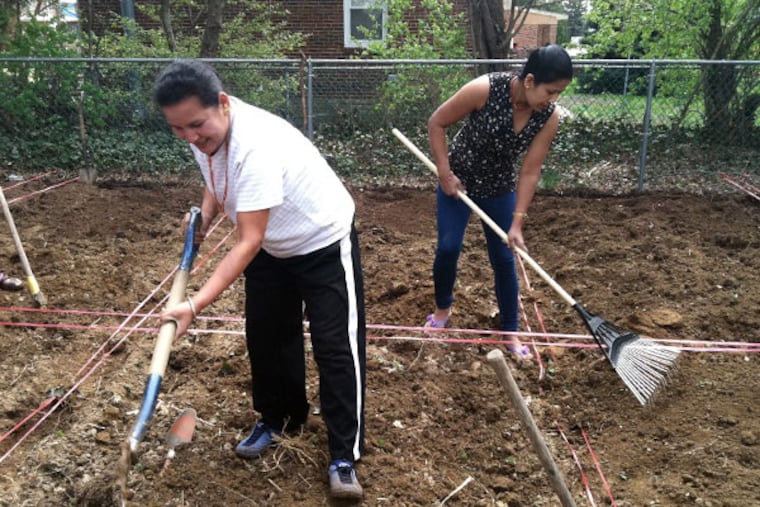Bhutanese refugees break ground at garden in NE Philly
Working the land is what their forefathers used to do.

TILLING THE SOIL at a new community garden for Bhutanese refugees in Northeast Philadelphia yesterday, Meena Dhimal smiled as she raked the land.
She said she would grow hot chile peppers and potatoes.
Dhimal, 27, and several other Bhutanese refugees of Nepali descent broke ground yesterday at a new community garden - a project of HIAS (Hebrew Immigrant Aid Society) Pennsylvania - on the property of All Saints Episcopal Church, at Loney and Frontenac streets in Rhawnhurst.
"This is really an opportunity for them to bring their home culture to their new lives here in Philadelphia" said Sarah Amazeen, director of refugee programming and planning at HIAS, one of Philadelphia's three refugee-resettlement agencies.
Many of the refugees or their family members "were farmers, gardeners in the past," when they lived in Bhutan, said Annie Reading, HIAS refugee resource and orientation coordinator.
The garden will serve seven Bhutanese refugee families who live in walking distance, Reading said. The project was two years in the making - it was hard to find a suitable location - until the group Partners for Sacred Spaces connected HIAS with the Episcopal Church, she said.
Community members estimate that about 3,000 Bhutanese refugees of Nepali descent live in Philadelphia, most of them in South Philly. Some were resettled here; others moved here after being resettled elsewhere in the U.S. More will resettled here in the future, Amazeen said.
The refugees fled Bhutan in the early 1990s after the government no longer recognized the ethnic Nepalese people who lived there as Bhutanese citizens, Amazeen said. They were persecuted because of their race and some for their religion - no longer allowed to practice Hinduism in Bhutan's Buddhist society, she said.
The refugees lived in camps in Nepal, many for about 20 years.
Dhimal was a young child when her family fled Bhutan in 1992. She spent almost 18 years in a refugee camp in Nepal, living with her family in a bamboo hut.
During that time, she went to school, got married and worked as a teacher in a school outside the camp. She and her husband were resettled in Philadelphia in 2010 and now have a 3-year-old son.
In South Philadelphia, Bhutanese and Burmese refugees have been gardening at the city's largest refugee garden - Nationalities Service Center's Growing Home Gardens - since 2011. The garden consists of several sites near 8th and Emily streets.
The garden now serves 99 refugee families and other neighborhood residents, said Juliane Ramic, director of social services at NSC, another of the city's refugee-resettlement agencies. "We grow 67 varieties of vegetables and herbs" and have "200 people on a waiting list," she said. "We're exploring expansion."
At the new garden in Northeast Philly, Hem Bhandari, 48, a Bhutanese refugee, said he was resettled here in 2010. Speaking in Nepali, he said through an interpreter that his forefathers used to farm.
Asked what he thought of the new garden, he said, "Really good."